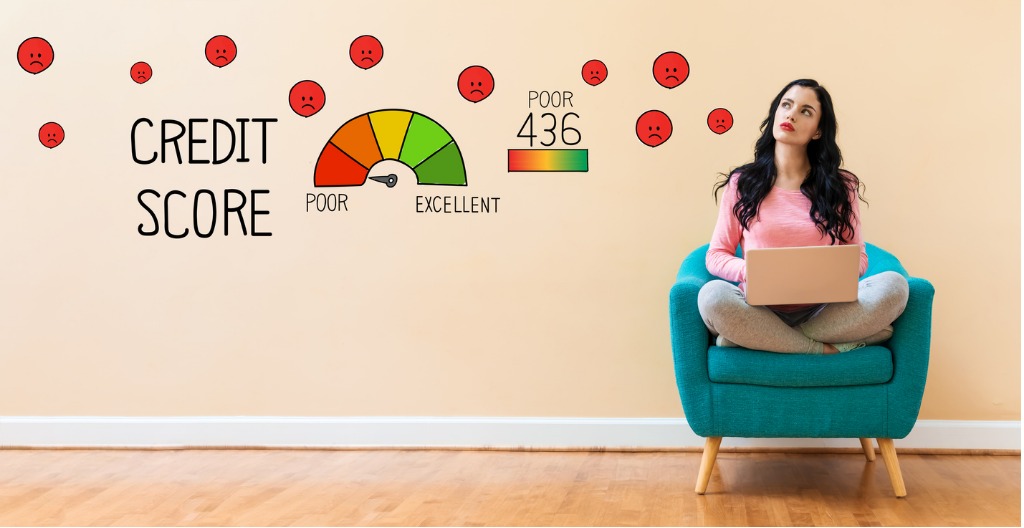- Home
- Derogatory
- Derogatory Accounts on Credit Report
The 6 Worst Derogatory Accounts on Credit Report Files and How to Deal With Them!

Derogatory accounts on credit report files when things don't go as planned. According to a recent report published by Experian, a whopping 59% of Americans have a good credit score, but getting to a 700 credit score or higher can be challenging.
Your credit data can influence everything from getting your dream home to the utilities you use – so it's definitely worth your attention.
A good credit score will give you access to more favorable interest rates, premium credit cards, and better loan products.
But if you have a terrible score – somewhere in the VantageScore range of less than 600 or FICO range of less than 580 – you'll miss out on those deals and even end up paying very high interest on auto loans, mortgage, and credit cards.
Derogatory Accounts on Credit Report 101.
Sadly, there are times when, for some reason, you fail to make a payment, and your credit score plunges. And as if that's not bad enough, you see derogatory accounts on your credit report. It could also be by mistake and will be a very stressful experience for you!
Learning about derogatory marks may seem overwhelming at first. But, understanding what you're dealing with plays a crucial role in better understanding derogatory accounts and dealing with them.
You need to understand what a derogatory file is and what it means to have derogatory marks on a credit report.
More importantly, it would be best to learn how to fight these credit score killers and come out on top.
Derogatory Accounts On Credit Reports: What Are They?
The word "derogatory" can be scary, and for a good reason. Derogatory accounts are marks/items on your credit report that are detrimental to your credit score.
These accounts identify you as being credit risk. In other words, a person who doesn't pay their debts or bills on time.
Some accounts reported on your credit report might lead to multiple derogatory items. Derogatory marks are those blemishes you want to avoid at all costs, and they crop up like credit report assassins, gut your credit score, and are almost equally hard to remove.
What's The Difference Between A Derogatory Account And A Delinquency Account?
Both derogatory and delinquency accounts are negative information on your credit record; they damage your credit score. They may also impact your ability to increase or get new credit because they indicate higher credit risk to lenders.
One significant difference between a derogatory account and a delinquency account is that the term "derogatory" refers to negative items on your credit that's been on your credit report for 180 days or more. At the same time, "delinquency" refers to negative credit account information less than 180 days.
6 Types Of Derogatory Accounts on Credit Reports.

You may wonder what constitutes a derogatory mark. Several items can appear on your credit record as derogatory. Regardless of the type of derogatory item on your credit report, they appear for two reasons: either by mistake or based on your actions, such as failing to pay debts and bills on time.
Below you will find typical types of derogatory accounts on credit reports and how long they stay on your credit report:
- Foreclosure: (7 years) – This happens when you fail to make your mortgage payments, and the lender seizes it hoping to recover the balance you owe by setting up the house. To avoid foreclosure, seek relief from your lender. They will usually have options such as mortgage refinance.
- Charge-Offs: (7 years) – This appears when a credit writes off your credit account as a loss because you have failed to make payments, and they assume that the debt is unlikely to be paid. Typically, charge-offs come into play after six months of missed payments.
- Bankruptcy: ( 7 and 10 years for and Chapter 13 and 7 Bankruptcy respectively) – When you feel you're stuck in an endless loop of debt and left short of breath now and then, you can file for bankruptcy. When you file for bankruptcy, you're asking the court to legally release you from your obligation to pay some or 100% of your debts. Because this affects your credit accounts, usually several of them, it's only natural to bring about a significant derogatory mark.
- Civil Judgments: (7 years) – These arise when a creditor or debt collection agency sues you over unpaid payments, and the court makes a judgment ordering you to pay.
- Collections: (7 years) – After a lender has charged off your account, they try to recover their loss by working in tandem with independent collection agencies to collect the balance. Other times, they give up and sell your account at a discount to debt collectors. When this happens, you might think you're out of the words, but you couldn't be more wrong. Collections are still negatives and can stay in your credit report for the better part of the next seven years.
- Repossessions: (7 years) – Repossession happens when your lender takes back your car or asset, often without warning, because you defaulted on payments.
Dealing With Derogatory Marks On Your Credit Report

We've all been there at some point. We forget to make credit payments or run into unforeseen financial obstacles that make it temporarily impossible to follow through with our bills and debts on time. Derogatory accounts on credit report files can be removed.
Several factors may have contributed to you falling behind in making payments:
- Divorce
- Loss of a loved one
- Laid off
- Just bad financial decisions
If you're not dealing with enough stress, you notice the term "derogatory" on your credit report. You start thinking:
Are the derogatory marks going to affect my credit? I can barely make ends meet!
If my credit score drops, I can't qualify for a mortgage! Will I have to write a letter explaining derogatory marks on my credit to get a mortgage?
Your mind keeps going on about derogatory accounts on your credit report.
OK, relax; there are ways to avoid and deal with derogatory accounts on credit reports, and you can start working towards restoring your credit right away.
Here's how:
- Regularly review your credit report.
- Make payments on time.
- If you're experiencing financial difficulties, contact your lender and try to work out a solution with them, such as reducing your monthly payments temporarily.
- Pay debts in full.
- Make better financial decisions.
- More importantly, enlist the services of a reputable credit repair company.
Derogatory accounts on credit reports can damage your credit score, and the worst thing you can do is ignore them.
If you spot a derogatory mark on your credit report, don't dispute it if it's inaccurate or reporting longer than it should. The good news is you can gain a jump start by enlisting a reputable credit repair firm's expertise.
Free 5-Day - Start Repairing Credit Challenge - Do It Yourself - Including A Live Expert Question & Answer Session.

Related Articles:
- Do You Need Real Time Credit Score Monitoring?
- 6 Strategies for Removing Derogatory Marks From Credit Reports!
- Can I Pay To Get Rid Of Derogatory Marks On My Credit?
- What Is Derogatory Credit? Remove These 8 Marks To Raise Your Credit Score Overnight!
- Credit Repair Shouldn't Cost a Fortune!
- 101 Credit Tips to Boost Credit Score Points, Today!
- Better Credit Booster News and Tips
- Frequently Asked Credit Repair Questions and Answers (FAQ)






